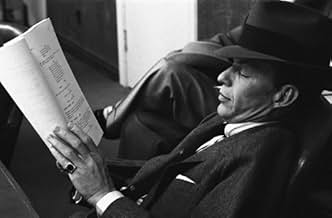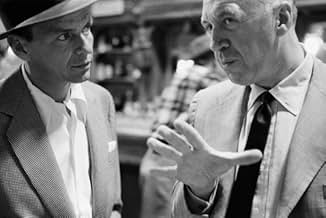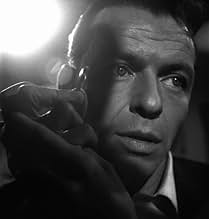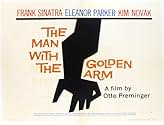AVALIAÇÃO DA IMDb
7,3/10
13 mil
SUA AVALIAÇÃO
Um drogado precisa de encontrar-se consigo mesmo para sair do seu inferno.Um drogado precisa de encontrar-se consigo mesmo para sair do seu inferno.Um drogado precisa de encontrar-se consigo mesmo para sair do seu inferno.
- Direção
- Roteiristas
- Artistas
- Indicado a 3 Oscars
- 3 vitórias e 8 indicações no total
Jered Barclay
- Junkie in Lock-Up
- (não creditado)
Leonard Bremen
- Cabbie in Lock-Up
- (não creditado)
Paul E. Burns
- Suspenders in Lock-Up
- (não creditado)
Pete Candoli
- Jazz Musician
- (não creditado)
Herschel Graham
- Club Safari Patron
- (não creditado)
Harold 'Tommy' Hart
- Officer Kvorka
- (não creditado)
Avaliações em destaque
I loved that this movie takes place on an imaginary block of an imaginary city. You could say the streets represents a state of mind just like the title of
Chinatown did two decades later. Here degeneracy and addiction are the
norm. This place sucks you in and wont let go. It's here that Sinatra must face his demons when he returns home after getting clean at a rehab clinic. The film ends up being just as much about moving on from the past as it does about drug addiction.
Sinatra's junky is a bit amorphous, we never really learn whether he grew up here or what led him to his addictions. However, the story is strong and told with a nice brisk pace. There are some real memorable moments (the Gambling
sequence, Frankie coming off smack, etc). Preminger's direction is great, some subtle camera work adds a lot to a number of scenes. Elmer Berstein's score
and Saul Bass' titles perfectly set the mood. Overall, an endearing film you should check out.
Chinatown did two decades later. Here degeneracy and addiction are the
norm. This place sucks you in and wont let go. It's here that Sinatra must face his demons when he returns home after getting clean at a rehab clinic. The film ends up being just as much about moving on from the past as it does about drug addiction.
Sinatra's junky is a bit amorphous, we never really learn whether he grew up here or what led him to his addictions. However, the story is strong and told with a nice brisk pace. There are some real memorable moments (the Gambling
sequence, Frankie coming off smack, etc). Preminger's direction is great, some subtle camera work adds a lot to a number of scenes. Elmer Berstein's score
and Saul Bass' titles perfectly set the mood. Overall, an endearing film you should check out.
A solid drama to begin with, "The Man With the Golden Arm" is particularly worthwhile for Frank Sinatra's performance as Frankie Machine. The movie was well-conceived, and it would probably have been worth seeing with any decent lead, but Sinatra makes it even better. The story is interesting and at times compelling, as Frankie struggles against himself and his circumstances.
The story is told from the viewpoint of its era, yet the basic elements are timeless enough that the story still holds up very well. The details of Frankie's situation are less important than the general themes of him battling his own desires while also contending against "friends" who simply want to use him for their own purposes.
Sinatra was good at this kind of role, as a character with his own inner demons who must also face hostile surroundings. He channels his nervous energy into expressions and gestures that convey well what is going on inside him. The actor Sinatra deserves to be remembered for roles like this one and his roles in "The Manchurian Candidate" and "From Here to Eternity", rather than for the insubstantial 'Rat Pack' features.
The supporting cast have simpler roles, but they do their jobs satisfactorily. The story moves at a good pace, and it is complemented by an Elmer Bernstein score which, though sometimes jarring, is appropriate. The combination works well as a whole.
The story is told from the viewpoint of its era, yet the basic elements are timeless enough that the story still holds up very well. The details of Frankie's situation are less important than the general themes of him battling his own desires while also contending against "friends" who simply want to use him for their own purposes.
Sinatra was good at this kind of role, as a character with his own inner demons who must also face hostile surroundings. He channels his nervous energy into expressions and gestures that convey well what is going on inside him. The actor Sinatra deserves to be remembered for roles like this one and his roles in "The Manchurian Candidate" and "From Here to Eternity", rather than for the insubstantial 'Rat Pack' features.
The supporting cast have simpler roles, but they do their jobs satisfactorily. The story moves at a good pace, and it is complemented by an Elmer Bernstein score which, though sometimes jarring, is appropriate. The combination works well as a whole.
Sinatra is thoroughly convincing as the addict in this grim horror story of what life is like for someone who has lost his soul to drugs. This is film noir made even more noir by the drab sets and lighting. We go through the terrifying experience of a man who is trying to escape from the monster he has placed on his own back.
Elmer Bernstein's score is a mixture of jazz and symphony that makes the addict's frightful journey even more believable to the audience.
This film opened the topic of drug addiction the way LOST WEEKEND broached the subject of alcoholism. At least people could talk about these addictions a little more freely.
Elmer Bernstein's score is a mixture of jazz and symphony that makes the addict's frightful journey even more believable to the audience.
This film opened the topic of drug addiction the way LOST WEEKEND broached the subject of alcoholism. At least people could talk about these addictions a little more freely.
Great story. Gritty 50's melodrama played very well by Sinatra and Novak. Great comedic performance by Arnold Stang who definitely deserved more attention after this film.
Also contains one of the most brilliant soundtracks to a film ever made. Sinister accompaniment to Frankie Machine's spiraling demise, it plays so well as the unrelenting "monkey on his back" appears again and again.
Great lingo, too. Very happy the word "lush" is used to describe an alcoholic. Very cool.
Great cinema. An underappreciated piece of American genius.
Also contains one of the most brilliant soundtracks to a film ever made. Sinister accompaniment to Frankie Machine's spiraling demise, it plays so well as the unrelenting "monkey on his back" appears again and again.
Great lingo, too. Very happy the word "lush" is used to describe an alcoholic. Very cool.
Great cinema. An underappreciated piece of American genius.
The Man with the Golden Arm was one of the first films to have as its main topic (and, in some respects, the message) the tragedy of heroin addiction. It's nowhere near a great film, but its importance lies in Otto Preminger's dedication to making it feel real and on the edge of melodrama and naturalism. What I liked is that it's not so much an expose of junkies (if you want the best expose of that read Naked Lunch, if you can get through it anyway, besides the point), but the nature of the urban environment Frankie Machine lives. He expects after he gets out of prison for dealing to go on the straight and narrow, to become a drummer in a band and make it legit as a musician. But he has his "crippled" wife Zosch, who can't work and needs money and often complains, and then there's the old neighborhood- he can't escape seeing Louie (Darren McGavin), who is still doing back-room card games and, yes, pushing dope. Like Mean Streets, it's hard to escape the minutia unless you leave.
But then again, it's hard for Frankie Machine not to try and operate naturally in this urban quarter. It's just that he can't escape the temptation of junk (when he's booked on a phony theft charge with his friend, he sees a junkie freaking out, and it puts back the fear of going back on into his clean self). And personifying Frankie is Sinatra, and I can't see anyone else who could've played him, even original choice Brando. He fits into the neighborhood, and seems like the kind of guy who should be a step ahead of the game. But there's also a vulnerability to Sinatra that he pulls out wonderfully, and by the time we see him going 'cold turkey' in Molly's apartment, it's believable even if it's not the kind of thing those from 'my' generation would think of heroin (i.e. Trainspotting and certainly Requiem for a Dream). If for nothing else, you want to watch the movie to see what happens to Sinatra as this character.
The flaws, however, come in some of the other performances, though it's a little tricky. Eleanor Parker seems to be overacting for a good portion of the movie, fooling Frankie that she's really crippled when in reality she can walk and is fooling him for one reason or another. But then it becomes clearer as it goes along- she's supposed to be nuts, and nuts with jealousy, and on that level it starts to get better. Meanwhile, Kim Novak is good, though not Vertigo-worthy, as the possible girl in the side but more like the voice of reason in the story. Then there's a Detective Bendar, who might be one of the most one-note characters/performances, ever. And also Sparrow, Frankie's nerdy friend, and the characters of Louie and Schiefka, and they're all played as one might expect them to (actually, McGavin is better than OK). As far as casting other talent around Sinatra, Preminger doesn't do all that great. And, frankly, some scenes kind of fall flat.
But there's a lot of fascination in the Man with the Golden Arm, and not just as some dated piece of sociological interest. It works as compelling drama, and as a message piece conveyed without being preachy or campy. It's a genuine article, just not exceptional.
But then again, it's hard for Frankie Machine not to try and operate naturally in this urban quarter. It's just that he can't escape the temptation of junk (when he's booked on a phony theft charge with his friend, he sees a junkie freaking out, and it puts back the fear of going back on into his clean self). And personifying Frankie is Sinatra, and I can't see anyone else who could've played him, even original choice Brando. He fits into the neighborhood, and seems like the kind of guy who should be a step ahead of the game. But there's also a vulnerability to Sinatra that he pulls out wonderfully, and by the time we see him going 'cold turkey' in Molly's apartment, it's believable even if it's not the kind of thing those from 'my' generation would think of heroin (i.e. Trainspotting and certainly Requiem for a Dream). If for nothing else, you want to watch the movie to see what happens to Sinatra as this character.
The flaws, however, come in some of the other performances, though it's a little tricky. Eleanor Parker seems to be overacting for a good portion of the movie, fooling Frankie that she's really crippled when in reality she can walk and is fooling him for one reason or another. But then it becomes clearer as it goes along- she's supposed to be nuts, and nuts with jealousy, and on that level it starts to get better. Meanwhile, Kim Novak is good, though not Vertigo-worthy, as the possible girl in the side but more like the voice of reason in the story. Then there's a Detective Bendar, who might be one of the most one-note characters/performances, ever. And also Sparrow, Frankie's nerdy friend, and the characters of Louie and Schiefka, and they're all played as one might expect them to (actually, McGavin is better than OK). As far as casting other talent around Sinatra, Preminger doesn't do all that great. And, frankly, some scenes kind of fall flat.
But there's a lot of fascination in the Man with the Golden Arm, and not just as some dated piece of sociological interest. It works as compelling drama, and as a message piece conveyed without being preachy or campy. It's a genuine article, just not exceptional.
Você sabia?
- CuriosidadesFrank Sinatra jumped at a chance to star in the film before reading the entire script.
- Erros de gravaçãoIn a scene about twenty minutes in, as the camera exits the bar following Frankie, the jukebox can be seen to slide out of the way of the camera at the bottom of the screen.
- ConexõesEdited into Bass on Titles (1982)
Principais escolhas
Faça login para avaliar e ver a lista de recomendações personalizadas
- How long is The Man with the Golden Arm?Fornecido pela Alexa
Detalhes
- Data de lançamento
- País de origem
- Idioma
- Também conhecido como
- El hombre del brazo de oro
- Locações de filme
- Empresa de produção
- Consulte mais créditos da empresa na IMDbPro
Bilheteria
- Orçamento
- US$ 1.000.000 (estimativa)
- Faturamento bruto mundial
- US$ 4.652
- Tempo de duração1 hora 59 minutos
- Cor
- Proporção
- 1.85 : 1
Contribua para esta página
Sugerir uma alteração ou adicionar conteúdo ausente

Principal brecha
By what name was O Homem do Braço de Ouro (1955) officially released in India in English?
Responda



































